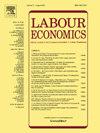A quantitative analysis of relaxing UI eligibility requirements
IF 2.6
2区 经济学
Q2 ECONOMICS
引用次数: 0
Abstract
From 1985 to 2019, administrative data indicates that 22% of unemployment insurance (UI) applicants were denied benefits annually due to eligibility requirements. This paper develops a quantitative equilibrium search model that incorporates realistic UI application processes and examines workers’ UI decisions and employment outcomes. Using this model, I analyze the role of eligibility requirements and the implications of incorporating them into policy evaluations. Relaxing earnings requirements increases take-up rates and generates a 4% welfare gain, benefiting low-income workers the most. In contrast, eliminating the separation requirement yields the highest welfare gain but also raises unemployment, highlighting the moral hazard effects of UI expansion. Lastly, a counterfactual analysis shows that ignoring UI eligibility leads to misleading predictions, overstating take-up rates and understating precautionary savings, underscoring the need to properly account for eligibility requirements in policy evaluations.
放宽用户界面资格要求的定量分析
从1985年到2019年,行政数据显示,由于资格要求,每年有22%的失业保险(UI)申请人被拒绝领取福利。本文开发了一个定量均衡搜索模型,该模型结合了现实的用户界面应用过程,并检查了工人的用户界面决策和就业结果。使用这个模型,我分析了资格要求的作用以及将其纳入政策评估的含义。放宽收入要求提高了就业率,并产生了4%的福利收益,低收入工人受益最大。相比之下,取消分离要求会产生最高的福利收益,但也会提高失业率,凸显了失业保险扩张的道德风险效应。最后,一项反事实分析表明,忽视失业保险资格会导致误导性的预测,夸大吸收率和低估预防性储蓄,强调需要在政策评估中适当考虑资格要求。
本文章由计算机程序翻译,如有差异,请以英文原文为准。
求助全文
约1分钟内获得全文
求助全文
来源期刊

Labour Economics
ECONOMICS-
CiteScore
3.60
自引率
8.30%
发文量
142
期刊介绍:
Labour Economics is devoted to publishing research in the field of labour economics both on the microeconomic and on the macroeconomic level, in a balanced mix of theory, empirical testing and policy applications. It gives due recognition to analysis and explanation of institutional arrangements of national labour markets and the impact of these institutions on labour market outcomes.
 求助内容:
求助内容: 应助结果提醒方式:
应助结果提醒方式:


